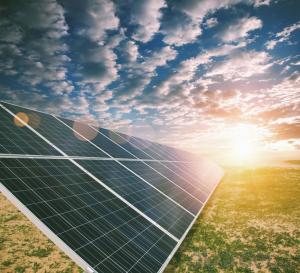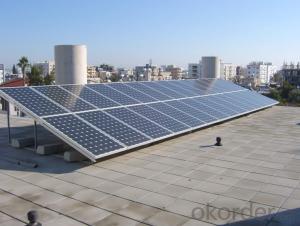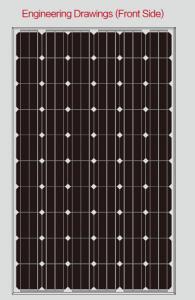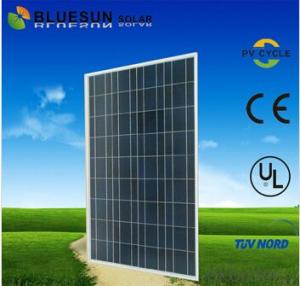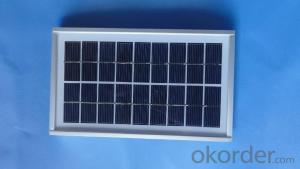Solar Panel 240w Silicon Polycrystalline
- Loading Port:
- Guangzhou
- Payment Terms:
- TT OR LC
- Min Order Qty:
- 200000 watt
- Supply Capability:
- 20000000 watt/month
OKorder Service Pledge
OKorder Financial Service
You Might Also Like
INTRODUCTION
We are a high-tech group wich specializes in solar products design,research, manufacture, sales,solar projects design and installation.
Our national sales service covers seven parts, including northeast, north, east, middle, south, northwest and southwest, international sales covers five continents and over forty countries, including Germany, Italy, Spain, France, America and Brazil etc.
This installation Manual contains essential information for the electrical and mechanical installation that your must know before installing CUSTOMER PV modules. This also contains safety information you need to be familiar with .All the information described in this manual are the intellectual property of CNBM and based on the technologies and experiences that have been acquired and accumulated in the long history of CUSTOMER. This document does not constitute a warranty, expressed or implied.
CUSTOMER does not assume responsibility and expressly disclaims liability for loss, damage, or expense arising out of in anyway connected with installation, operation, use or maintenance of the PV modules. No responsibility is assumed by CUSTOMER for any infringement of patents or other rights of third parties that may result from use of PV module.
CUSTOMER reserves the right to make changes to the product, specifications or installation manual without prior notice.
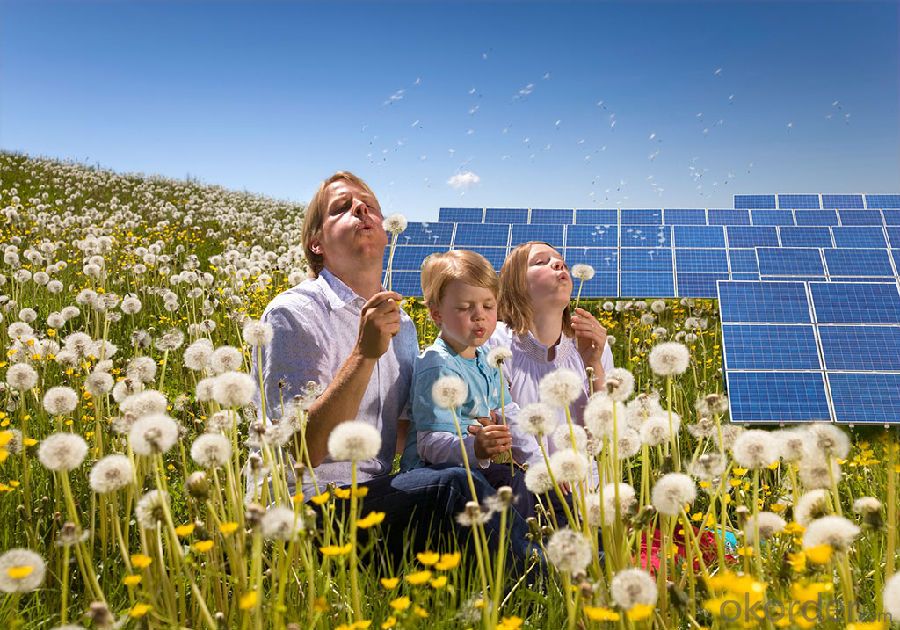
GENERAL INFORMATION
The installation of PV modules requires a great degree of skill and should only be performed by a qualified licensed professional, including licensed contractors and licensed electricians. Please be aware that there is a serious risk of various types of injury occurring during the installation including the risk of electric shock. All CUSTOMER modules are equipped with a permanently attached junction terminal box that will accept variety of wiring applications or with a special cable assembly for ease of installation, and they do not require assembly.
DATA SHEET
Maximum Power | 240W |
Efficiency | 0.148 |
Backsheet | White |
Frame Colar | Silver |
Manufacture Site | China |
Frame | Anodized Aluminum Alloy |
Weight | 19 kg |
FAQ:
Q1: Why buy Materials & Equipment from OKorder.com?
A: All products offered byOKorder.com are carefully selected from China's most reliable manufacturing enterprises. Through its ISO certifications, OKorder.com adheres to the highest standards and a commitment to supply chain safety and customer satisfaction.
Q2: What is a solar PV module?
A: A solar PV module consists of many solar cells that are connected together (typically in series) and packaged in a frame (typically made of aluminum).
Q3: What are the advantages and disadvantages of monocrystalline solar PV modules?
A: Monocrystalline solar PV modules are the most efficient type of solar PV modules, with the exception of CdTe thin film solar PV modules. As a result, monocrystalline solar PV modules are more expensive when compared to almost all other types of solar PV modules.
- Q:i already have solar/gas water heating, but was wondering if getting solar panels for electricity installed was a good idea.
- Sure they work, photovoltaics. Light goes in, electricity goes out. Is it a good idea? Well. See, they're expensive. You probably need several kilowatts of capacity to run your house for one thing, and that's going to require several thousands of dollars worth of panels. And electricity doesn't cost that much. You can figure out how long it would take you to make the expense back. It would be a while. It would take even longer if you wanted to spring for a system that could take you completely off the grid, that would require banks of deep cycle batteries too. But most people are probably fine with a system that ties into the grid, and depending on who your utility is you may be able to sell surplus power back to them. Expense is the main reason I think you don't see a huge number of people adopting photovoltaics yet. Doesn't explain why solar heating isn't more popular though. That's really cheap and practical by comparison. But yeah you can find the photovoltaic panels for sale all over the place. Google it. Yeah the going rate for panels is around 2 bucks a watt.
- Q:Can solar panels be used for powering outdoor lighting?
- Yes, solar panels can be used to power outdoor lighting. Solar panels absorb sunlight and convert it into electricity that can be stored in batteries. This stored energy can then be used to power outdoor lights, making them a sustainable and cost-effective option for outdoor lighting.
- Q:So my buddy and I have an idea to start a small Solar Installation business. Small as in I am only willing to do one weekend a month and two weeks a year(I know it sounds like the reserves). These are my specific question:) What is the average cost in the U.S. to have Solar Panels installed?2) What is the average cost in the state of Hawaii to install Solar Panels?3)Is this a worth while venture? (There's a good chance i'm going to ignore this one anyways LOL!)4)How long does it take to install a photovoltaic solar panel?5)How long does it take to install a hot water solar panel?6)Besides the obvious, what permits are needed to get our start?7)What education or Cert. is needed?8)Average time to start up?If there is any other information you believe pertinent to this subject that I didn't ask directly, please share. Thank you for your help in advance!
- Cba to read all that, but all I know is for 3 sola pannles it cost abot 5000 xxx
- Q:I need to know how do solar panels work. I need to know what are they made of.
- The term solar panel is best applied to a flat solar thermal collector, such as a solar hot water or air panel used to heat water, air, or otherwise collect solar thermal energy. But 'solar panel' may also refer to a photovoltaic module which is an assembly of solar cells used to generate electricity. In all cases, the panels are typically flat, and are available in various heights and widths.
- Q:Solar panel for battary charging
- What you are stating is that the battery you have will operate the UPS for about 2 hours before it is drained past the point of no return (technically 2.82 hours, but that would be a dead battery - most well-designed UPS systems cut off when the battery gets below about a 30% charge so that battery is not damaged. Lead-Acid batteries have about a 0%/month self-discharge rate if there is no load connected. The very best systems are as low as 3%, the worst are over 20% - and all at a 'normal' temperature. So, you will need a maintenance charger of about ten (0) watts or so - amp will be more than enough. And about any solar panel will handle that much with the proper charging connection.
- Q:Can solar panels be used for powering a hospital or healthcare facility?
- Yes, solar panels can be used for powering a hospital or healthcare facility. Solar energy can be harnessed through photovoltaic panels to generate electricity, which can be used to meet the power demands of various medical equipment, lighting, heating, and cooling systems in hospitals and healthcare facilities. This not only helps reduce reliance on traditional energy sources but also provides a sustainable and eco-friendly solution for powering critical medical infrastructure.
- Q:Can solar panels work in cloudy weather?
- Yes, solar panels can still work in cloudy weather, although their energy production may be reduced. Cloud cover reduces the amount of sunlight reaching the panels, resulting in a lower output. However, modern solar panels are designed to generate electricity even in low-light conditions, making them still effective in producing energy during cloudy days.
- Q:We see increasing, what appear to be, solar panels on electric poles?
- I work in NJ and we started seeing them around our industrial park. I think it's probably some scam for the most part. Each panel isn't going to put out more than a few volts. Because they are so widely distributed about the only thing they might be good for is lighting a sodium bulb or something. A much more effective use if it was a serious / more efficient/effectively designed project, we'd probably be seeing farms of panels going up all over the place and on the tops of big-box buildings, but I'm not seeing alot of that.
- Q:Do I need some type of regulator when the batteries are fully charged.?? The Arco Panels voltage is approx 7VDC at 2.5 amps, Should I limited the voltage to 4VDC???. I would like to connect both panels to up to five batteries at one time...???
- You can buy Solar Charger Regulators. I don't. These chargers limit the charging current to the batteries, so you do not get a full efficiency of the solar panel. They disconnect the batteries from the user side (the bulbs you use) if the battery voltage goes below a certain level (i.e. below 8V for a 2V battery), so you cannot use all the power available in the batteries, even in emergency. They introduce, at least, a 0.7V loss (diode forward voltage) between the panel and the battery. If you have SEVERAL panels and a lot of batteries, use a controller as above. If you only have one panel, insert a 5A trip fuse in line (in your case: twice the current of the panel), and a 0-20A diode in series between the panel and the batteries (Kathode side of the + of the battery, Anode side of the + of the panel). Install a voltmeter across the battery. The fuse will prevent any short or over-charge current. The diode will prevent the battery to discharge into the panel at night if it is not already protected. The voltmeter will allow you to watch the status. Your thought of limiting the voltage is useless: should the battery be low, the panel will drop its voltage, limited by the max current. Should the battery be fully charged and the solar panel at full efficiency, it will just try to charge the battery more. A bit of bubbles may result, hence the voltmeter to watch over it. If you want to limit the voltage to 4V, put a 4V Zener (4Vx2.5W!) in series with a resistor of, say, 7V-4V/2.5A or ~ Ohm, 5W, in parallel with the panel.
1. Manufacturer Overview |
|
|---|---|
| Location | |
| Year Established | |
| Annual Output Value | |
| Main Markets | |
| Company Certifications | |
2. Manufacturer Certificates |
|
|---|---|
| a) Certification Name | |
| Range | |
| Reference | |
| Validity Period | |
3. Manufacturer Capability |
|
|---|---|
| a)Trade Capacity | |
| Nearest Port | |
| Export Percentage | |
| No.of Employees in Trade Department | |
| Language Spoken: | |
| b)Factory Information | |
| Factory Size: | |
| No. of Production Lines | |
| Contract Manufacturing | |
| Product Price Range | |
Send your message to us
Solar Panel 240w Silicon Polycrystalline
- Loading Port:
- Guangzhou
- Payment Terms:
- TT OR LC
- Min Order Qty:
- 200000 watt
- Supply Capability:
- 20000000 watt/month
OKorder Service Pledge
OKorder Financial Service
Similar products
New products
Hot products
Related keywords
